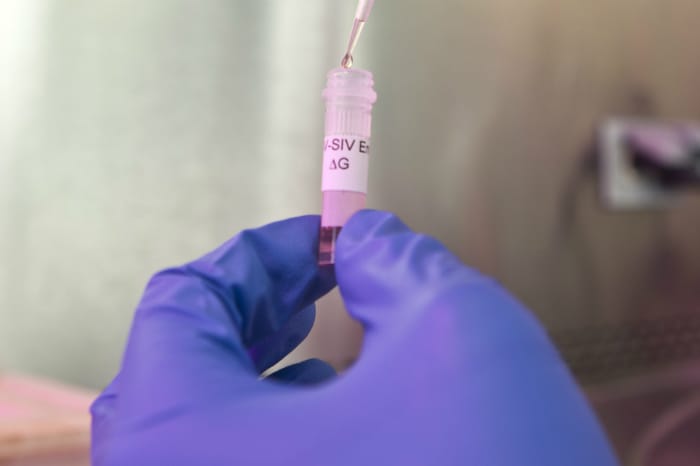CAMBRIDGE, England– Crescendo Biologics Ltd (Crescendo), the developer of novel, targeted, T cell enhancing therapeutics, and Cancer Research UK, the world’s largest independent funder of cancer research, today announce a Clinical Development Partnership to progress one of Crescendo’s novel bispecific Humabody® immunotherapies, CB213, into clinical trials targeting cancers of high unmet medical need.
Under the terms of the agreement, Cancer Research UK’s Centre for Drug Development will sponsor and fund a future Phase I clinical trial for CB213, in patients with solid tumours. Crescendo retains the right to further develop the CB213 immunotherapy programme, by licensing the results of the trial from Cancer Research UK for an undisclosed amount, success-based milestones and royalty payments.
CB213, a novel bispecific PD-1 x LAG-3 antagonist, is a next-generation checkpoint inhibitor, which has been designed to deliver safer, more effective therapeutic intervention in patients with cancers resistant or refractory to PD-1 blockade alone. In preclinical testing, CB213 has demonstrated potent dual checkpoint blockade and the ability to enhance the activity of dysfunctional patient-derived T cells.
Theodora Harold, CEO of Crescendo Biologics, said:
“We are delighted to be collaborating with the world-renowned institution of Cancer Research UK to advance our CB213 programme. Cancer Research UK’s endorsement of our science demonstrates important validation of our Humabody technology and provides an opportunity to accelerate our CB213 programme into the clinic. CB213 is a promising therapeutic candidate for treating patients with solid tumours, where conventional or combination immunotherapies have failed. We look forward to working with the team at Cancer Research UK’s Centre for Drug Development.”
Dr Nigel Blackburn, Cancer Research UK’s Director of Drug Development, said:
“We’re proud to be working with Crescendo at the forefront of oncology innovation and cancer drug development. By combining our expertise, we’re able to accelerate the development of this promising experimental treatment, bringing it to patients with cancers that are hard to treat.”
About Crescendo Biologics
Crescendo Biologics is a T cell enhancing company. Crescendo develops potent, truly differentiated Humabody® VH therapeutics with a focus on innovative, targeted T cell approaches in oncology.
Leading its proprietary pipeline, Crescendo Biologics has developed CB307, a novel CD137 (4-1BB)
x PSMA bispecific, targeting PSMA-positive tumours for the selective activation of tumour-specific T cells exclusively within the tumour microenvironment. CB307 is designed to achieve a longer lasting anti-cancer effect whilst avoiding systemic toxicity and is on track to enter the clinic in 2020. The company has a broad portfolio of additional Humabody products in preclinical development as well as a strategic partnership with Takeda Pharmaceuticals, where three Humabody products are currently advancing towards the clinic.
The Company’s ability to develop multi-functional Humabody® VH therapeutics is based on its unique, patent protected, transgenic mouse platform generating 100% human VH domain building blocks (Humabody® VH). These robust molecules can be configured to engage therapeutic targets in such a way that they deliver novel biology and superior bio-distribution. This results in larger therapeutic windows compared to conventional IgG approaches. Humabody®-based formats can be applied across a range of indications beyond cancer.
Crescendo Biologics is a private company located in Cambridge, UK, and is backed by blue-chip investors including Sofinnova Partners, Andera Partners, IP Group, Takeda Ventures, Quan Capital and Astellas.
About Cancer Research UK’s Centre for Drug Development
Cancer Research UK has an impressive record of developing novel treatments for cancer. The Cancer Research UK Centre for Drug Development has been pioneering the development of new cancer treatments for 25 years, taking over 140 potential new anti-cancer agents into clinical trials in patients. It currently has a portfolio of 21 new anti-cancer agents in preclinical development, Phase I or early Phase II clinical trials. Six of these new agents have made it to market including temozolomide for brain cancer, abiraterone for prostate cancer and rucaparib for ovarian cancer. Two other drugs are in late development Phase III trials.
About Cancer Research UK’s Commercial Partnerships Team
Cancer Research UK is the world’s leading cancer charity dedicated to saving lives through research. Cancer Research UK’s specialist Commercial Partnerships Team works closely with leading international cancer scientists and their institutes to protect intellectual property arising from their research and to establish links with commercial partners. Cancer Research UK’s commercial activity operates through Cancer Research Technology Ltd., a wholly owned subsidiary of Cancer Research UK. It is the legal entity which pursues drug discovery research in themed alliance partnerships and delivers varied commercial partnering arrangements.
About Cancer Research UK
- Cancer Research UK is the world’s leading cancer charity dedicated to saving lives through research.
- Cancer Research UK’s pioneering work into the prevention, diagnosis and treatment of cancer has helped save millions of lives.
- Cancer Research UK receives no funding from the UK government for its life-saving research. Every step it makes towards beating cancer relies on vital donations from the public.
- Cancer Research UK has been at the heart of the progress that has already seen survival in the UK double in the last 40 years.
- Today, 2 in 4 people survive their cancer for at least 10 years. Cancer Research UK’s ambition is to accelerate progress so that by 2034, 3 in 4 people will survive their cancer for at least 10 years.
- Cancer Research UK supports research into all aspects of cancer through the work of over 4,000 scientists, doctors and nurses.
- Together with its partners and supporters, Cancer Research UK’s vision is to bring forward the day when all cancers are cured.

